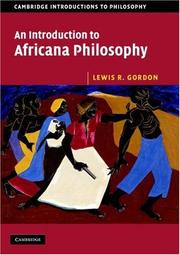| Listing 1 - 3 of 3 |
Sort by
|

ISBN: 9780521675468 9780521858854 0521858852 0521675464 9780511800726 9781282390294 9780511402524 051140252X 9780511404191 0511404190 0511399855 9780511399855 9780511649905 0511649908 051180072X 1282390295 1107177421 0511568797 0511398662 9781107177420 9780511568794 9780511398667 Year: 2008 Publisher: Cambridge : Cambridge University Press,
Abstract | Keywords | Export | Availability | Bookmark
 Loading...
Loading...Choose an application
- Reference Manager
- EndNote
- RefWorks (Direct export to RefWorks)
In this undergraduate textbook Lewis R. Gordon offers the first comprehensive treatment of Africana philosophy, beginning with the emergence of an Africana (i.e. African diasporic) consciousness in the Afro-Arabic world of the Middle Ages. He argues that much of modern thought emerged out of early conflicts between Islam and Christianity that culminated in the expulsion of the Moors from the Iberian Peninsula, and from the subsequent expansion of racism, enslavement, and colonialism which in their turn stimulated reflections on reason, liberation, and the meaning of being human. His book takes the student reader on a journey from Africa through Europe, North and South America, the Caribbean, and back to Africa, as he explores the challenges posed to our understanding of knowledge and freedom today, and the response to them which can be found within Africana philosophy.
Philosophy --- Africa --- Philosophy, African --- Philosophy, African. --- African philosophy --- Philosophy. --- Mental philosophy --- Humanities --- Arts and Humanities --- African American philosophy --- History.
Multi
ISBN: 9783031270260 9783031270253 9783031270277 9783031270284 Year: 2023 Publisher: Cham : Springer Nature Switzerland : Imprint: Palgrave Macmillan,
Abstract | Keywords | Export | Availability | Bookmark
 Loading...
Loading...Choose an application
- Reference Manager
- EndNote
- RefWorks (Direct export to RefWorks)
This book brings together the work of Wilfrid Sellars with work in 20th century phenomenology and 21st century speculative realism in order to think through one of the most important predicaments of contemporary philosophy. As a result of the disenchantment of nature in late modernity, philosophy has struggled to account for the place of persons, construed as loci of normative authority and responsibility, within a scientifically, naturalistically described world, bereft of values and norms. The book argues that Sellars takes both the framework of persons and science seriously and thinks that this implies the need not just for reconciling the manifest and scientific images but for fusing them into one stereoscopic vision of reality and our place in it. One of the main aims of this book is to address the issue of the form which a non-alienated experience of ourselves-in-the-world would take in the Sellarsian cryptic stereoscopic fusion of the manifest and the scientific image. Through an extended discussion of Sellars’ relevance for contemporary continental philosophy and phenomenology, in which his views on perception, the commonsense ‘lifeworld’, science, normativity, personhood, morality and process metaphysics are presented and extended, the book sketches a novel view about what a stereoscopic fusion of the manifest and the scientific image would amount to at the level of our lifeworld experience.
Philosophy --- Philosophy of science --- filosofie --- wetenschapsfilosofie --- existentialisme --- Philosophy, American. --- Phenomenology. --- Science—Philosophy. --- American Philosophy. --- Philosophy of Science.
Multi
ISBN: 9783031325465 9783031325458 9783031325472 9783031325489 Year: 2023 Publisher: Cham : Springer International Publishing : Imprint: Palgrave Macmillan,
Abstract | Keywords | Export | Availability | Bookmark
 Loading...
Loading...Choose an application
- Reference Manager
- EndNote
- RefWorks (Direct export to RefWorks)
This book considers the role of postmodernism (skepticism towards metanarratives and anti-essentialism) in Ralph Waldo Emerson's philosophy by putting it in conversation with key 20th and 21st century thinkers such as Beauvoir, Coates, Derrida, Paz, Rorty, and Zizek. Postmodern Emerson shows how Emersonian skepticism to metanarratives such as sexism, racism, Beauvoiran "serious values," and others, can help us face some of society's gravest contemporary social and philosophical challenges. Methodologically, the book exemplifies Emersonian postmodernism by defying traditional philosophical metanarratives about the difference between high and low culture or serious and ridiculous subjects, and Emerson with what would seem to be his opposite. This is itself a postmodern gesture, breaking rules of genre and topic to make unlikely but interesting connections. Above all, this book proves that in this time of social division and widespread despair, Emerson can help.
Philosophy --- filosofie --- postmodernisme (filosofie) --- pragmatisme --- Europe --- Philosophy, American. --- Postmodernism. --- Pragmatism. --- Continental Philosophy. --- American Philosophy. --- Post-Modern Philosophy. --- American Literature --- Philosophie --- Literatur --- Skeptizismus --- Postmoderne --- Emerson, Ralph Waldo --- Theory of knowledge
| Listing 1 - 3 of 3 |
Sort by
|

 Search
Search Feedback
Feedback About
About Help
Help News
News